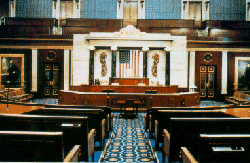|
Hutchinson
Introduces Highway Funding
Legislation
Bill Aimed at Completion of I-49,
US-412
Last Friday, I introduced legislation to direct more federal
money to Arkansas high-priority highway projects. Specifically, the
bill will require states to spend portions of their federal funds on
construction projects in "high priority corridors."
Forty-three routes across the country have been designated
high-priority corridors because of their importance to the nationís
transportation infrastructure and economic development. Four of
these highways are in Arkansas: Interstate 49, ranked as the
nationís number 1 high priority corridor; U.S. Highway 412, ranked
as high priority corridor number 8; Interstate 69; and U.S. Highway
63.
Over the past several years, Arkansas has received extra highway
funds from surplus gas tax revenues. Unfortunately, these
dollars have not been used for important interstate projects.
My legislation, known as the "Priority Corridor Equity Act of 2000,"
will require states to spend their surplus federal turnback funds ó
$15-20 million annually in Arkansasís case ó on construction
projects within high priority corridors.
It is important both to the economic development of our state and
to the safety of our families that these high-priority roads be
completed.
Back
to Table of Contents
HILL &
DISTRICT TALK
News
About Congress and the Third District
House Passes Death Tax Repeal
Currently, when someone dies, the federal government assesses a
tax of up to fifty-five percent on the value of his estate. This
"double tax" is a burden to hard-working Arkansas family farmers and
small business owners. That is why I was pleased to vote in
favor of H.R. 8, the "Death Tax Elimination Act," which repeals
estate, gift and generation-skipping taxes in their entirety over
the next ten years. H.R. 8 passed the House last week by a
vote of 279-136.
The private sector spends $23 billion to comply with the death
tax laws each year -- money that could be better spent on education
or health care. Not only does the death tax increase costs and
eliminate jobs, but it places an unfair burden on families grieving
lost loved ones -- especially small business owners and farmers. In
addition, it discourages Americans from working hard and being
prosperous during their lifetimes. For these reasons, I believe that
these taxes must be lowered or eliminated altogether.
- Read the text of H.R. 8 online via the Library of Congress's
THOMAS.
- Read my column
on the death tax repeal.
Question of the
Week: This week, the
House of Representatives voted overwhelmingly to eliminate the death
tax. Do you think this tax should be repealed? Let me
know at my Electronic
Town Hall Discussion Board.
Government Reform Subcommittee to Mark Up
Hutchinson Privacy Protection Commission
The Government Reform Subcommittee on Government
Management, Information and Technology will mark up legislation I
introduced to create a Privacy Protection Commission. The markup
will be Wednesday, June 14th at 4:00 p.m. in Washington,
D.C.
The bipartisan commission would be unique in Congress
because of its comprehensive approach to dealing with the growing
concern Americans have regarding the protection of their personal
privacy ó whether that be identity theft, online privacy or the
protection of health, medical, financial and governmental
records.
Protecting our Children
I recently co-sponsored H.R. 4600, a bill introduced
by Representative Chip Pickering (R-MS) which requires any school or
library that receives money from the Universal Service Fund -- also
known as the E-rate tax -- to have a filtering device on their
computers to block minors' access to pornographic information. This
is another important step which will help to keep smut out of our
children's hands.
Back
to Table of Contents
LAST WEEK'S ACTION
Highlights on Legislation Addressed by Congress Last
Week
Last week the House debated and voted on the FY2001
Defense Appropriations Bill and the Death Tax Elimination Act, among
other bills.
Back
to Table of Contents
ON
THE FLOOR THIS WEEK
Legislation Scheduled for Action
This Week
This week the House will debate and vote on the FY2001
Interior Appropriations Bill, FY2001 VA/HUD Appropriations Bill, and
the Debt Reduction and Reconciliation Act of 2000, among other
bills.
View the full House
schedule for this week.
View the current House
floor proceedings.
Back
to Table of Contents
CONSTITUENT CORNER
A Monthly Feature
on Congressional Services for Constituents
Federal Depository Library Program
 One of the bedrock principles of
our nation is providing the public with uninhibited access to
government information. Since the mid-1800s, the Federal Depository
Library Program has collected and organized government publications
for public use by students, scholars, and citizens. These materials
are held at numerous libraries throughout the nation and provide
local and free public access to government publications. The Third
District has several federal depository collections which are open
to the public at the following locations: One of the bedrock principles of
our nation is providing the public with uninhibited access to
government information. Since the mid-1800s, the Federal Depository
Library Program has collected and organized government publications
for public use by students, scholars, and citizens. These materials
are held at numerous libraries throughout the nation and provide
local and free public access to government publications. The Third
District has several federal depository collections which are open
to the public at the following locations:
University of Arkansas
Mullins
Library
Fayetteville, AR 72701
501-575-5516 |
University of the Ozarks
Robson
Library
415 North College Avenue
Clarksville, AR
72830
501-979-1832 |
University of Arkansas
Young Law
Library
Fayetteville, AR 72701
501-575-5604 |
Arkansas Tech
University
Pendergraft Library
Highway 7
North
Russellville, AR
72801
501-968-0289 |
Previous Constituent Corners:
Back
to Table of Contents
DID YOU KNOW...?
History and Background about the U.S.
Congress
Redistricting and Apportionment: The Reasons
behind the Number of Representatives
 The House of Representatives has not always had
435 members. In fact, the Constitution only stipulates that
the House have at least one representative for each state but not
more than one representative for every 30,000 people. If that
pattern were followed today, the House would have well over 8,000
members! The House of Representatives has not always had
435 members. In fact, the Constitution only stipulates that
the House have at least one representative for each state but not
more than one representative for every 30,000 people. If that
pattern were followed today, the House would have well over 8,000
members!
The size of the House increased with each census until 1910, when
the House of Representatives had 435 representatives. After
the 1920 census, however, numerous disputes prevented Congress from
reaching a conclusion about the number of members, and the size was
left at 435 members as a compromise. In 1929, the Permanent
Apportionment Act was passed, setting 435 as the permanent ceiling
for members of the House.
The Supreme Court has since ruled that each district within a
state should have approximately the same population, and after each
census, states redraw their congressional boundaries. This
does not prevent districts in different states from having very
different populations. For example, Arkansas's Third District
has 589,523 residents, while Montana's only House member represents
nearly 800,000 citizens.
- Learn about the role of Census 2000 in
congressional redistricting and apportionment.
- Beginning Wednesday, June 14, you can submit comments about proposed
redistricting in Arkansas to the state Board of Apportionment.
Back
to Table of
Contents |